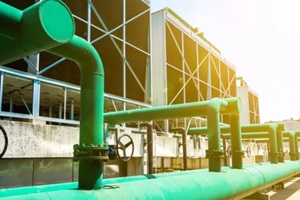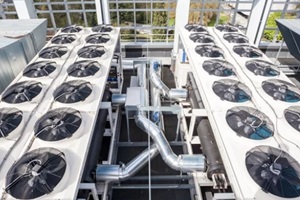 Proper cooling tower maintenance is critical, especially in New York City where stringent regulations like Local Law 77 aim to prevent Legionnaires’ disease outbreaks. Neglecting maintenance can lead to system breakdowns, increased energy costs, and the hazardous growth of Legionella bacteria. As spring arrives, it’s crucial for facility managers and their teams to prepare cooling towers for summer’s high heat and humidity.
Proper cooling tower maintenance is critical, especially in New York City where stringent regulations like Local Law 77 aim to prevent Legionnaires’ disease outbreaks. Neglecting maintenance can lead to system breakdowns, increased energy costs, and the hazardous growth of Legionella bacteria. As spring arrives, it’s crucial for facility managers and their teams to prepare cooling towers for summer’s high heat and humidity.
This guide outlines key maintenance areas that facility personnel should address, while highlighting when to involve an experienced professional water treatment provider to ensure optimal performance, energy efficiency, and full Local Law 77 compliance.
Responsibilities for Facility Personnel
1. Routine Practices
Facility staff should conduct visual inspections to identify visible fouling, corrosion, or other issues. Periodic deep cleaning of the fan, basin, fill, and drift eliminators is necessary to remove built-up debris that hampers efficiency and risks operational failures.
Lubricating motors, fans, and pumps prevents premature wear. Weekly tasks include testing basic water quality parameters or even bacteria, as well as regular visual inspections.
2. Enhanced Checks
On a monthly basis, facility personnel should inspect strainers, inspect the fill coil section for scale buildup, and check for dry areas/damaged nozzles. If any physical replacements of tower components are required be sure to consult an HVAC expert if there is not one on staff.
3. Seasonal Responsibilities
While year-round maintenance is necessary, different seasons require varying focus from facility teams:
- Spring: Conduct extensive inspections ahead of summer, remove debris accumulated over winter, restart basic chemical treatment (descalers, etc.) as temperatures rise.
- Summer: Frequently monitor overall performance, ensure proper water levels/airflow for cooling efficiency, and vigilantly inspect for any leaks, corrosion, wear and tear, or signs of bacterial growth. As this is also peak season, be sure to monitor and ensure cooling is consistent as reduction in cooling capacity could be a sign of an issue.
- Fall: Begin winterizing processes by thoroughly inspecting all components. Assess system performance during peak summer months and address any emerging issues.
- Winter: For idle towers, drain to prevent freeze damage. For operational towers, implement freeze protection measures. Inspect all components to ensure they can handle the reduced winter load.
When to Involve a Professional Water Treatment Provider
While facility personnel can handle many routine maintenance items, ensuring full compliance with Local Law 77 requires partnering with an experienced professional water treatment provider like Tower Water. They should be involved in:
1. Preventive Legionella Control Strategies
A water treatment professional emphasizes comprehensive Legionella prevention and water quality control strategies for Local Law 77 compliance. This includes following manufacturer guidelines for cleaning/disinfecting cooling towers before commissioning, seasonal startup, idling periods, and shutdowns.
Routine Legionella testing and maintaining comprehensive records are mandatory under Local Law 77 and best handled by a professional. Implementing temperature control by running towers below 77°F (25°C) minimizes Legionella growth risk.
2. Advanced Water Treatment
Automated chemical addition (anti-corrosion, anti-scale, disinfectants) and monitoring by a treatment professional ensures consistency. They can provide proper guidance on regularly monitoring disinfectant residuals, pH, and adjusting frequencies to maintain control.
 For multiple towers, a professional recommends balanced/rotational operation to avoid stagnation. Automated blowdown processes and proper filtration maintained by experts reduce water quality issues.
For multiple towers, a professional recommends balanced/rotational operation to avoid stagnation. Automated blowdown processes and proper filtration maintained by experts reduce water quality issues.
Annual thorough disinfection and cleaning of the entire system is an essential service provided by water treatment professionals. They also develop comprehensive emergency plans to address any water service disruptions impacting treatment efficacy.
3. Comprehensive Compliance Evaluations
At a minimum twice per year, an experienced provider like Tower Water should comprehensively evaluate all aspects of the cooling tower system. This ensures optimal functioning while confirming full compliance with stringent Local Law 77 requirements.
Benefit from NYC Cooling Tower Expertise
Partnering with an expert like Tower Water provides invaluable expertise on implementing customized, sustainable water management strategies to consistently meet all Local Law 77 requirements for any NYC facility’s unique needs.
While building personnel handle many routine tasks, ensuring strict Legionella control, water quality, and regulatory compliance requires the specialized skills of a professional water treatment provider. Their expertise ensures reliable cooling tower performance, extends equipment life, improves energy efficiency, and avoids costly breakdowns or violations.
If you have any additional questions, need help with services, or want a comprehensive checklist developed for your particular system, feel free to contact the experienced professionals at Tower Water. Discover how we can help you today.
